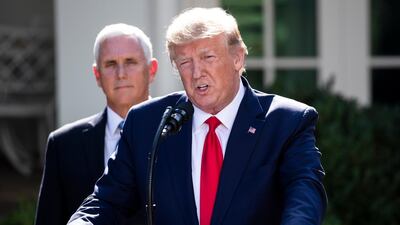US President Donald Trump said on Friday that the United States was not involved with a failed Iranian rocket launch, and he wished Tehran “best wishes and good luck” at finding out what went wrong.
"The United States of America was not involved in the catastrophic accident during final launch preparations for the Safir SLV Launch at Semnan Launch Site One in Iran," President Trump tweeted on Friday.
The rocket exploded on its launch pad at a space centre in northern Iran on Thursday, an Iranian official said. According to Reuters, a US official also said Iran suffered a satellite launch failure.
The White House is raising economic pressure on Tehran over its nuclear program.
On Wednesday, the United States imposed new sanctions on Iran, hitting two networks that it says helped boost Tehran’s nuclear programme and evade financial measures to benefit the government and military.
One of the networks used a Hong Kong-based front company to avoid sanctions and target US technology and components on behalf of people tied to Iran's government and its Islamic Revolutionary Guard Corps, the US Treasury Department said.
Washington walked away from a 2015 nuclear deal with Iran agreed under former President Barack Obama and five other countries, and has ratcheted up sanctions on Tehran, including imposing penalties on Iran's Foreign Minister Mohammad Javad Zarif.
The minister says he is unaffected by the sanctions.
European foreign ministers called on Thursday for intensified dialogue with Iran to capitalise on the French initiative at the G7 in Biarritz while reiterating the preservation of the 2015 nuclear must remain a top priority.
French President Emmanuel Macron hopes to create enough common ground for direct talks between Iranian and US representatives.
Earlier this week on Monday, Mr Trump said at a news conference that he would be open to meeting with Iran's President Hassan Rouhani.
On Thursday, Mr Zarif said that Iran would only be interesting in meeting for talks with Washington if it ceased it’s “economic terrorism” against them and observed the 2015 nuclear deal.

